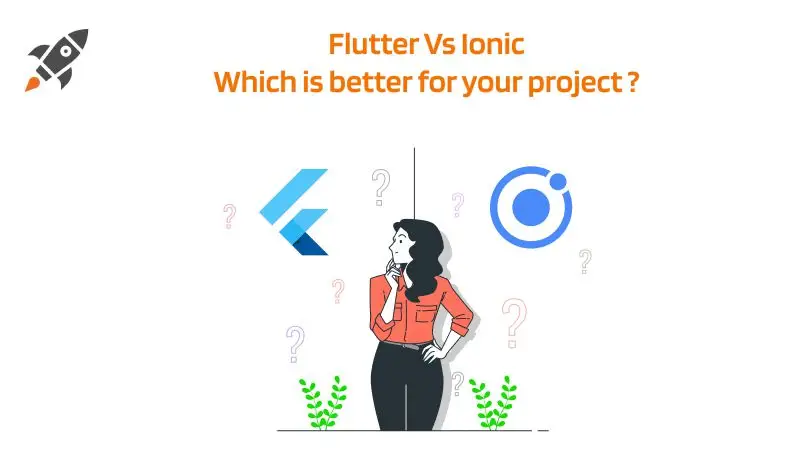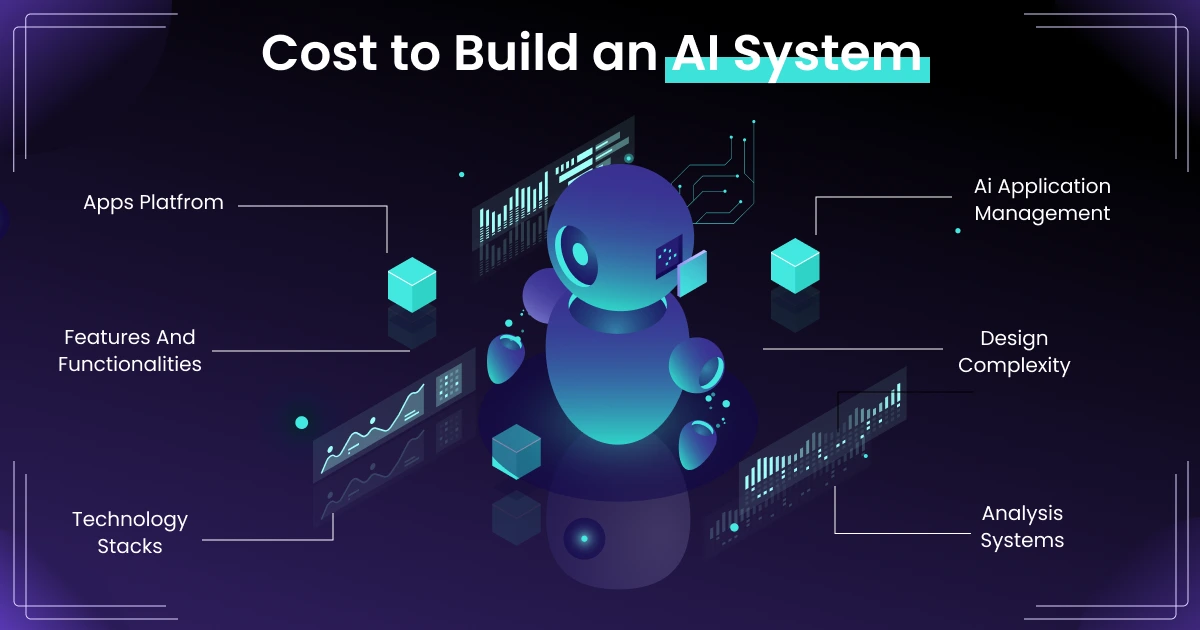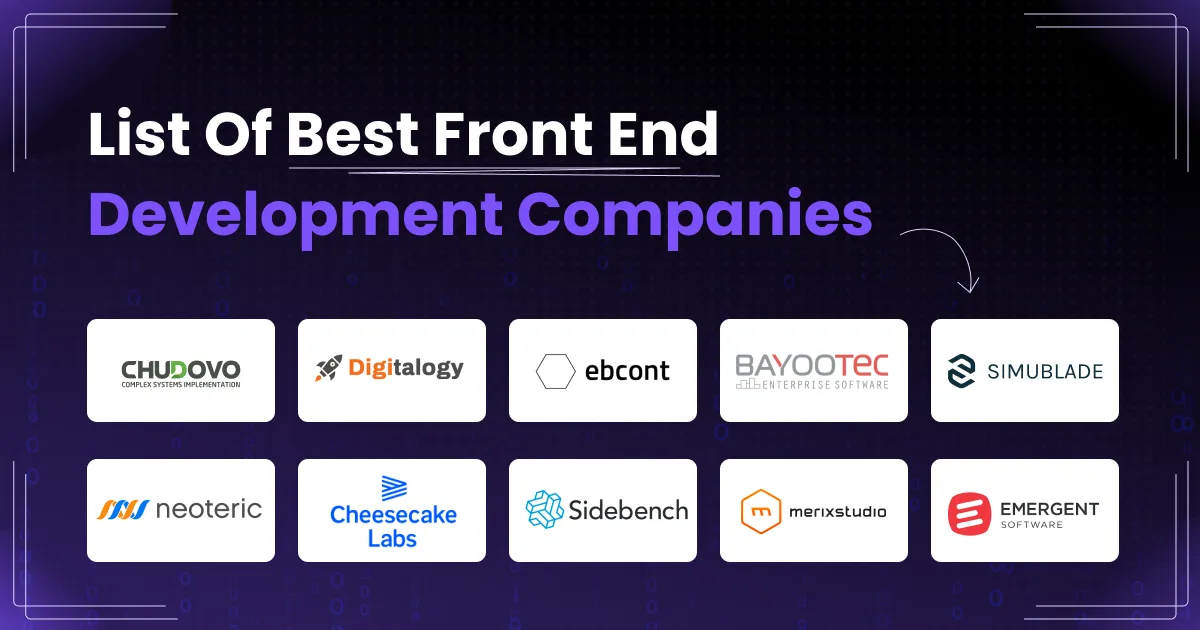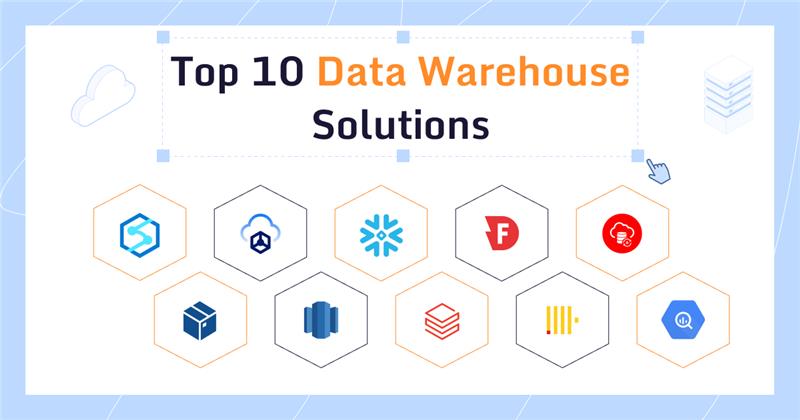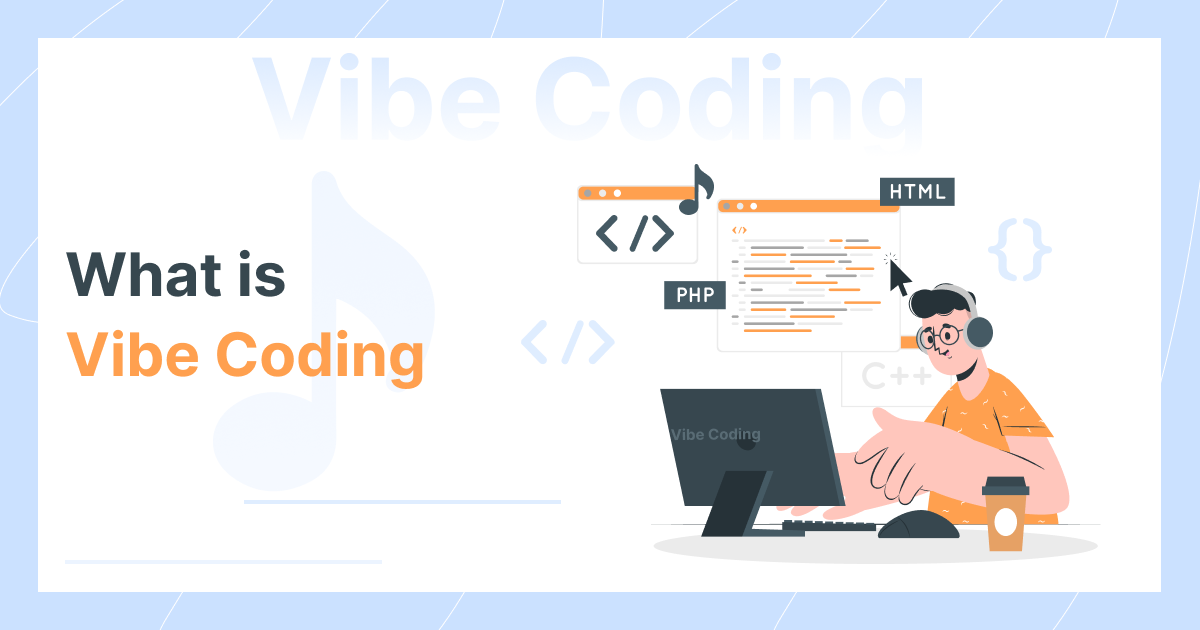When it comes to Android app development, the competition is quite tough among the companies. That is why developers look for ways to reduce the development time and launch the apps faster in the market. One of the best ways is to leverage hybrid or cross-platform frameworks.
Flutter and Ionic are the two most widely used hybrid frameworks. Both frameworks help in the development of unique Android apps with much ease. Choosing between the two is often a challenge for developers. In this blog, you will explore Flutter vs. Ionic, which will enable you to make the apt choice for your next development project.
Also Read – Hire Remote Developers For Your Business.
What is Ionic?
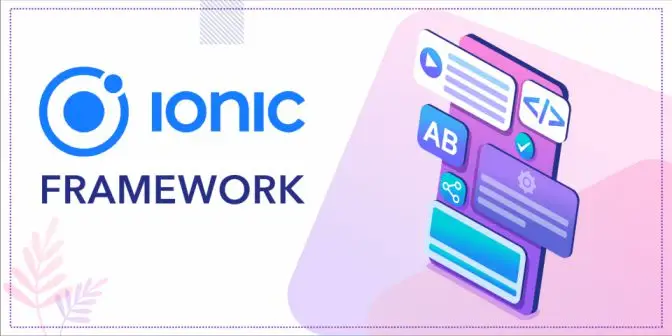
Ionic is an open-source UI toolkit and framework that was initially released by Drifty Co. in 2013. The framework was actually developed by three coders named Adam Bradley, Ben Sperry, and Max Lynch. While it was built on AngularJS, you can get a lot more options now.
Besides AngularJS, it also supports React and Vue. JS. Ionic allows the development of cross-platform mobile apps. It enables developers to build high-performing, effective apps with JavaScript, HTML, and CSS.
The ease of use and compatibility of the framework makes it a popular development tool for app developers. The framework makes use of Cordova and capacitor plugins to access different host components like cameras and GPS.
The extensive community of Ionic enables the developers to get valuable support during the Android app development process. The best thing about this framework is that the app built on Ionic can be customized with much ease.
What is Flutter development?
Flutter is another important cross-platform framework used for Android app development. Flutter was introduced by Google for developing native and high-performing mobile apps. The first version of the framework was first released in 2018.
Flutter is developed with Dart. Flutter enables the construction of cross-platform applications using a single codebase. Flutter has a lot of similarities with the React framework. For instance, it has a just-in-time compilation, a 2D rendering engine, a hot reload feature, and various other features.
In addition, the pre-built widgets of Flutters help in developing the basic prototypes of applications faster. Applications such as eBay, Alibaba, Reflectly, and even Google Ads have been built using the Flutter framework.
Advantages of using Ionic in your project
Now that you have a basic idea of Flutter vs. Ionic, it is important to know the benefits of using each of the frameworks for your project. Here are some of the significant benefits of using the Ionic framework for app development.
- Platform Independence
One of the main benefits of using Ionic is its platform independence. The platform independence feature of the framework helps in reducing the time and effort of developers. It also significantly lowers the resources required for building cross-platform applications. However, it ensures providing the apps with a native look and feel.
- Scalability
Ionic offers great scalability. That means even when the number of users increases, it will not affect the performance in any way. It helps in enhancing the overall experience of the users. In addition, it also ensures that the apps built on Ionic are easily accessible through different devices.
- Simplified Developer Interface
Ionic makes the app development task of developers quite simple and easy. The use of a capacitor helps developers save a great deal of time in app development. Additionally, it offers a simple interface for gaining access to native SDK and native API on platforms. The Ionic framework requires programmers to write a single codebase utilizing well-known JavaScript modules and frameworks. It lessens the necessity of continually rewriting the codes.
- Easy Testing
In order to ensure that the apps are bug-free, testing is vital. Ionic allows easy testing of the applications. It ensures the delivery of flawless apps for enhanced user experiences.
- Community Support
Another prominent benefit of using Ionic for your next app development project is its community support. Ionic is developed on the popular technology of AngularJS. Therefore, it has a strong and active community. The community support of Ionic allows the developers to get a quick answer to their queries and speeds up the development process.
Advantages Of Using Flutter In Your Project
To understand Flutter vs. ionic, which is better, you will also have to know the benefits of using Flutter for your app development. Here are the major benefits of using Flutter for your next development project.
- Hot Reload
Hot reload is a unique feature of the Flutter framework. The developers can see the modifications to the scripts as soon as they are made thanks to this. However, it has no impact on the application’s current status.
- Seamless Integration
The best thing about using Flutter for your Android app development project is that you do not have to write the codes again and again. It can easily integrate with Swift, Java, and Objective C for Android and iOS app development. This, in turn, helps the developers to save more time.
- Code Sharing
You may create codes using Flutter and share them across several platforms. When numerous developers are engaged in an app development project, it is extremely helpful. It allows faster development of the apps.
- Rich Widgets
Flutter framework comes with a number of rich and powerful widgets. It helps in adding rich functionalities to the applications and enhancing user experience.
- Quick Iteration
Another advantage of choosing Flutter for your app development project is a quick iteration cycle. With Flutter, you have to test one codebase only.
Flutter vs. Ionic: Common differences
Still wondering about Flutter vs. ionic, which is better? In that case, here are the significant differences you must know.
- Performance
When choosing a framework, it is always important to consider its performance. The Flutter vs. Ionic performance is a crucial aspect that helps in the determination of the right framework for app development.
Flutter is popular for its ability to create original animations. Animations help in making mobile apps more engaging for users and enhancing their experience. So, if you want to develop animated apps, Flutter is undoubtedly the best option for you.
However, that does not mean the performance of Ionic is less. It can provide you with the same performance when you want to develop employee-facing or standard consumer apps. A point to note here is that the performance of the apps mainly depends on the codes. So, if you write high-quality codes, the performance is sure to be excellent.
- Sustainability
Sustainability is another important factor when it comes to finding Flutter vs. Ionic, which is better. Sustainability refers to the flexibility and shelf-life of the project. In terms of sustainability, Ionic apps are known to be more sustainable than Flutter apps. Ionic allows developers to diversify their skills.
However, it is not possible in the case of Flutter. Flutter is considered to be a closed system. The framework is also still young. So, the skills that are relevant for Flutter apps may not be useful for other non-Flutter apps. Clearly, Ionic is more flexible than Flutter.
- Code Portability
When it comes to deploying the apps across different mobile and desktop applications, there is tough competition between Flutter and Ionic. The codes of both Flutter and Ionic perform well on the web and mobile devices. With Flutter, developers can build visually appealing Android apps using a single set of code. However, it has certain limitations in terms of web deployment. On the other hand, Ionic can be easily deployed on the web, mobile, and even desktop.
- Knowledge and Skillset
Knowledge and skillset are other factors to consider when comparing Flutter vs. Ionic. Ionic is a popular JavaScript framework. As most developers are well-versed with JavaScript, building Ionic apps is quite easy. On the other hand, Flutters uses the Dart language. So, to become a Flutter app developer, you will have to learn the Dart language.
As Flutter has a closed ecosystem, the skills you acquire while learning Flutter can only be applied to the Flutter apps. Those skills become irrelevant for the non-Flutter apps. But when you learn Ionic, you not only learn the framework but also build web applications in general. With Ionic, you get to learn styling with CSS, writing with JavaScript, and building high-performing web components. It helps in expanding your skillsets and can prove to be beneficial anywhere you go.
- Native Look and Feel
In terms of UI, both Flutter and Ionic offer a native look and feel to the users. Both frameworks do not, however, make use of native UI components. Instead, they regularly update the design components automatically. Moreover, both Flutter and Ionic allow developers to access native APIs in a hassle-free manner. Flutter and Ionic rely on Material Design and Cupertino for Android and iOS app development.
- Learning Curve
When it comes to the learning curve, Ionic is easier to learn than the Flutter framework. The web technology of the Ionic framework makes it quite simple and easy to understand for the developers. On the other hand, learning the Flutter framework is a little complex and takes time. It is mainly due to the fact that you will have to understand the Dart language to learn Flutter.
Flutter vs. Ionic Future Scalability Comparison
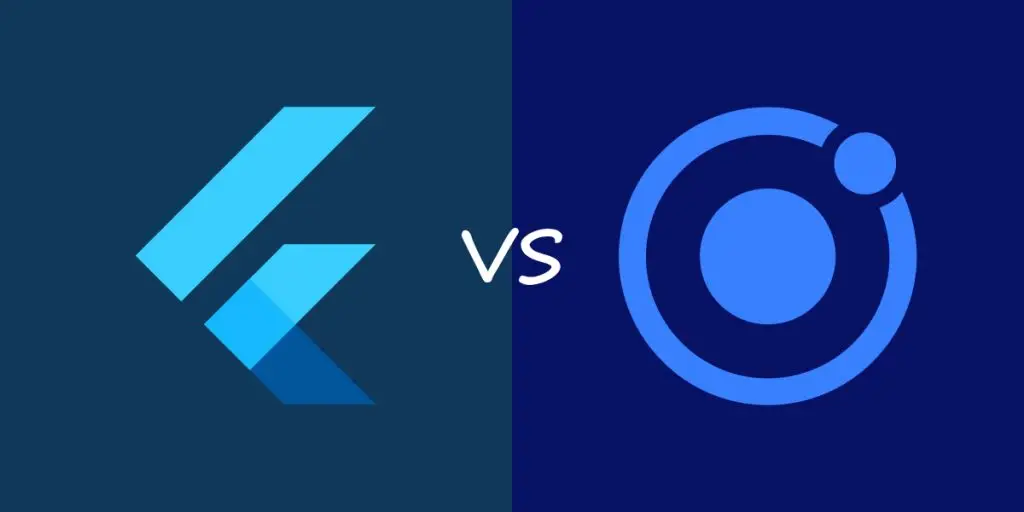
By now, you must have gained a better understanding of Flutter vs. Ionic. To compare the future scalability of the frameworks and understand Flutter vs. Ionic, which is better, you need to know the usage of each of them.
Ionic is mainly used for developing:
- MVC mobile apps
- Hybrid mobile apps
- High-performing UX/UI apps
- Native wrapper
- Hardware functionality enabled apps
On the other hand, the Flutter framework is used for developing:
- Minimally Viable Product (MVP) apps
- Apps with OS-level features
- Material design apps
- Brilliant widgets and flexible UI
- Advanced OS plugins
- Reactive apps with massive data integration
- High-performing apps with a Skia rendering engine
Architect comparison of Ionic and Flutter
Architecture is yet another important aspect that you must consider when discussing Flutter vs. Ionic, which is better. Let’s explore the architecture of both app development frameworks.
- Flutter Framework Architecture
Flutter has a layered architecture. It mainly consists of two layers. The two layers work together to optimize and enhance the functionality, performance, scalability, and robustness of Flutter apps. The first layer is the Dart framework, while the second one is the C++ engine.
The Dart layer helps in implementing and maintaining the widgets, animations, gestures, foundation structure, and rendering of the Flutter apps. On the other hand, the second layer of the framework is responsible for binding the Dart framework with different channels.
The C++ engine in the second layer of Flutter consists of Dart, Skia, and Text. It helps in triggering and calling the native OS APIs. Moreover, the hot reload feature is present in the first layer of the framework. It allows displaying the changes made to the codes in just 3 seconds.
- Ionic Framework Architecture
The architecture of the Ionic framework is based on the AngularJS MVC. Over the years, the Ionic framework has been updated several times. The architecture of the framework has also been modified. The current architecture is in the form of layers. It consists of three layers.
The first layer of the architecture is the developer framework layer. The second layer is the JavaScript to Native bridge layer. The third layer is the web view layer or host application layer. All the layers of the framework work together to ensure optimum communication and better data flow.
The architecture of the Ionic framework allows the developers to build multi-page as well as single-page cross-platform mobile apps. It also enables a number of developers to work on a single application together without any problem.
This, in turn, helps in reducing the development time of Android apps and enhances the productivity of developers. Moreover, the creation of multiple views is also possible due to the architecture of the Ionic framework.
User experience with Flutter and Ionic
When comparing Flutter vs. Ionic, user experience is also a vital determining factor. In terms of user experience, Flutter offers a rich user experience with custom widgets, simple tools, and elements. To customize the user interface, all you need is a strong understanding of StreamBuilder, AnimationBuilder, and FutureBuilder.
The generational garbage collection feature is an element of Dart. It allows the developers to build UI frames for different object codes that may be temporary. This generational garbage collection feature of Dart helps in the allocation of objects in a pointer bump. It allows neglecting clutter, UI junk, and animation shutter lag during the app development process.

On the other hand, the Ionic framework provides the best user experience. It guarantees a rich and seamless experience for Android application users. The hybrid method eliminates the need to submit the latest updates of the apps to the app store.
Instead, you can directly send live updates to the mobile devices of users. That means your users will not have to download the apps several times to get the latest updates. It can contribute to enhancing consumers’ overall pleasure and experience.
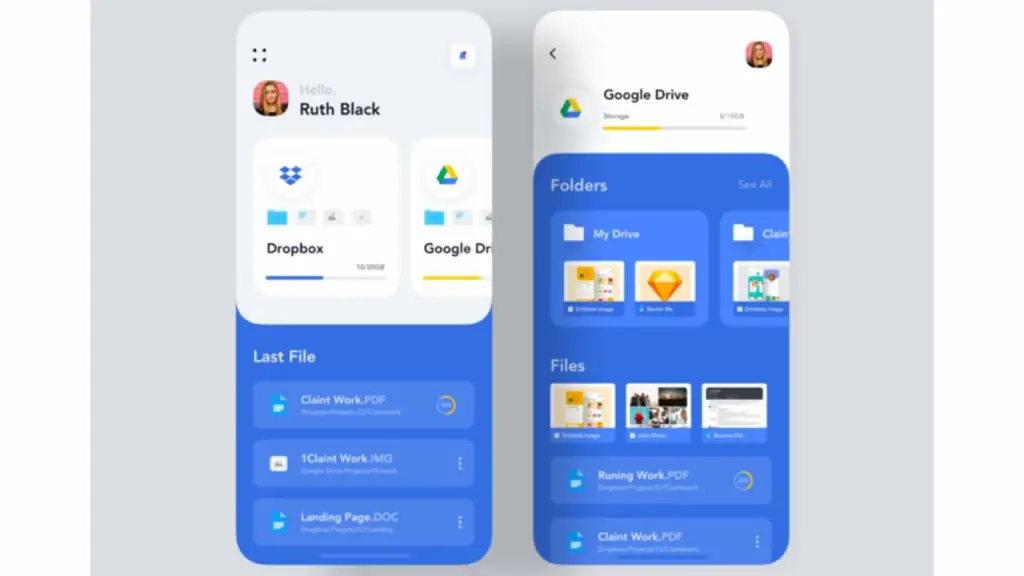
Flutter vs. Ionic: Which is better for your project?
Now that you have a comprehensive idea about both Ionic and Flutter frameworks, it is time to conclude whether Flutter vs. Ionic, is better. Both Flutter and Ionic frameworks are ideal for developing high-performing cross-platform Android apps. The best choice for your next Android app development project will completely depend on your specific requirements. It depends on factors such as the objectives of your business, your user requirements, and the platforms on which you want to launch the apps.
If you have good knowledge of Dart and want to develop apps with customizable UI, Flutter can be the best option. It allows you to easily develop Android mobile apps within your tight budget and deadline. It also enables you to write and deploy codes quickly.
On the other hand, if you have a new app idea and want to launch your startup, Ionic can be a perfect choice. It is ideal for developing apps on web-based technologies. Ionic is a great framework for building simple apps that do not require high-end customization.
Whether you want to develop Ionic apps or Flutter apps, make sure to collaborate with a professional app development company for the best outcomes. With the help of professional developers, you can create flawless and high-performing apps to deliver an exceptional user experience.
FAQs
What are the popular apps built with the Ionic framework?
Several apps have been built using the Ionic framework. Some of the most popular Ionic-powered apps are Microsoft Flow, Diesel, Sworkit, MarketWatch, and TD Ameritrade Mobile.
How big is the Ionic community?
As Ionic was launched in 2013, it has a huge community of developers. The Ionic community consists of more than 5 million developers from nearly 200 different countries. Reddit and Github are some popular platforms to connect with the vast Ionic community.
Which is more difficult to learn – Ionic or Flutter?
Flutter is more difficult to learn compared to Ionic. It is because you will have to gain knowledge of Dart for a better understanding of Flutter.

